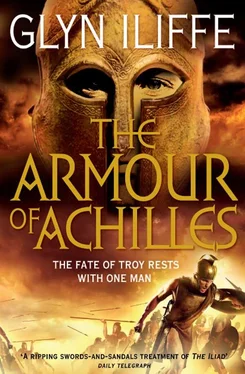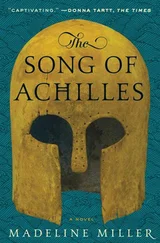Glyn Iliffe - The Armour of Achilles
Здесь есть возможность читать онлайн «Glyn Iliffe - The Armour of Achilles» весь текст электронной книги совершенно бесплатно (целиком полную версию без сокращений). В некоторых случаях можно слушать аудио, скачать через торрент в формате fb2 и присутствует краткое содержание. Год выпуска: 0101, ISBN: 0101, Издательство: Pan Books, Жанр: Старинная литература, на английском языке. Описание произведения, (предисловие) а так же отзывы посетителей доступны на портале библиотеки ЛибКат.
- Название:The Armour of Achilles
- Автор:
- Издательство:Pan Books
- Жанр:
- Год:0101
- ISBN:9781447205098
- Рейтинг книги:4 / 5. Голосов: 1
-
Избранное:Добавить в избранное
- Отзывы:
-
Ваша оценка:
- 80
- 1
- 2
- 3
- 4
- 5
The Armour of Achilles: краткое содержание, описание и аннотация
Предлагаем к чтению аннотацию, описание, краткое содержание или предисловие (зависит от того, что написал сам автор книги «The Armour of Achilles»). Если вы не нашли необходимую информацию о книге — напишите в комментариях, мы постараемся отыскать её.
The Armour of Achilles — читать онлайн бесплатно полную книгу (весь текст) целиком
Ниже представлен текст книги, разбитый по страницам. Система сохранения места последней прочитанной страницы, позволяет с удобством читать онлайн бесплатно книгу «The Armour of Achilles», без необходимости каждый раз заново искать на чём Вы остановились. Поставьте закладку, и сможете в любой момент перейти на страницу, на которой закончили чтение.
Интервал:
Закладка:
‘Out of my way,’ he warned them. ‘I’ve no quarrel with you.’
‘But we have with you, you Greek scum,’ the third man answered.
They fanned out around him. Eperitus saw the man to his right crouch, ready to spring, and immediately lashed out with his sword. The man lifted his shield, but too late to prevent the point of the blade slicing across his eyeballs and the bridge of his nose. He screamed in agony and fell to his knees, clutching at his face. An instant later his comrades attacked, screaming defiance as their swords beat down simultaneously against Eperitus’s raised shield. Using his great strength to throw both men back, he brought his sword around in a low sweep at the legs of the nearest. His opponent saw the attack too late and could only watch in horror as the blade hacked into his left leg below the knee. He collapsed on to his shield, thrashing about with pain and spraying blood across the dry earth of the street.
The remaining Lycian looked at his two colleagues, the first now unconscious and the second oblivious to everything but the pain of his wound, and decided he had seen enough. Throwing down his weapons, he turned and fled. Without hesitation, Eperitus placed his foot on the chest of his second victim.
‘Have you seen Apheidas?’
The man gave a great sob of pain and tried to twist free, but Eperitus leaned his weight upon him and slapped the flat of his sword against his cheek.
‘I said , have you seen Apheidas!’
The man reached out a shaky hand towards Eperitus, begging for mercy. Eperitus placed the point of his sword against the man’s throat and drove it through into the earth beneath. The Lycian’s lifeless head lolled to one side and he was silent.
‘I’m here, Son.’
Eperitus whirled round to see a figure standing in the shadowed portico of the temple. The dull gleam of a drawn blade shone at his side.
‘You fought well,’ he said. ‘If your grandfather was alive he’d have been mighty proud of such a display.’
‘Not as proud as he’d have been to see me run you through, traitor.’
Apheidas chuckled. ‘Still so angry, Eperitus? Come now, such excessive rage goes against nature and the will of the gods. You must leave it behind.’
Laying his blade casually over his shoulder, he turned and disappeared between the tall wooden doors of the temple. Eperitus felt a bead of sweat trickle down across his cheek. Swatting it away, he gripped his sword so tightly that his knuckles turned white, then he walked up to the pillared threshold. The familiar temple smell of perfumed incense and woodsmoke drifted out from the darkened doorway. In the blackness beyond he could see an avenue of painted wooden columns, fading to grey as the shadows swallowed them, and a floor flagged with stone slabs, worn to a black-edged smoothness by generations of worshippers. He stepped inside and instantly felt the warmth of the sun sucked from his flesh by the chill, stagnant atmosphere of the temple.
He paused and scanned the heavy shadows, waiting patiently for his eyes to adjust, relying instead on the acuteness of his hearing and the supernatural ability of his skin to sense the slightest movement in the air. It reminded him of the ruined temple at Messene, where he and Odysseus had once fought an ancient serpent placed there by Hera. As he recalled the terrifying battle with the giant snake he noticed two points of light at the far end of the temple. They gleamed like eyes in the darkness, and indeed that was what they were – not living eyes, but the glass eyes of an idol. Half his own size, the painted wooden effigy stood in an alcove behind the white-washed stone altar. It had been carved with an ankle-length chiton, large breasts and a golden bow in its left hand. Eperitus shuddered: he was in the temple of Artemis.
There was a movement in the shadows beside the altar. Apheidas stepped from behind one of the painted columns and laid his sword irreverently on the plinth where sacrifices were offered to the goddess.
‘How long’s it been, Son? Eighteen years?’
‘Twenty, and my hatred of you hasn’t faded, Father. When you killed Pandion and took his throne for yourself, you brought a shame on our family that can never be removed – except by your death. I intend to claim that honour for myself, now.’
He raised the point of his sword, lifted his grandfather’s shield higher and took a cautious step forward.
‘Don’t be hasty, Eperitus. You’ve waited this long; at least listen to what I have to say before you do something we might both regret.’
Eperitus took another slow step and saw his father’s hand edge towards the handle of his sword.
‘There’s nothing you can say to me, Father. Your shadow’s lain over my life for too long and now I’m going to set myself free of it.’
‘A man can change, Eperitus. Twenty years ago I was only a little older than you are now – I was young and impetuous, thinking with my heart and not giving my head a say. I made a mistake.’
‘And now you’re making another.’
Eperitus lunged, aiming above the leather breastplate at his father’s unprotected throat. With astounding speed, Apheidas seized his sword from the altar and brought it up to meet his son’s blade. Bronze scraped across bronze until the two hilts locked against each other. Eperitus stared into his father’s dark eyes for a moment, but instead of seeing a reflection of his own hatred he saw something infinitely more disarming. For the briefest moment, he saw the father he had known as a boy – a man fiercely proud of his son; a man whom he had looked up to and admired. Then he remembered that his childish admiration had been destroyed by an act of unforgivable evil, and with a snarl of fury on his lips he pushed his father back against the altar and brought his sword down upon him. Again Apheidas’s reactions were quicker than Eperitus had expected, meeting the blow with the edge of his blade and at the same time kicking out with his foot, catching Eperitus in the stomach and sending him sprawling across the stone flags. He landed with his back against one of the columns and a cloud of dust fell down over his head.
Springing back to his feet, he moved out to meet the inevitable follow-up attack. But Apheidas did not take the advantage he had created, and instead moved behind the protection of the altar.
‘Don’t be a fool, Son. Can’t you see I regret what I did in Alybas? Your older brothers were killed fighting at my side, but . . .’ Apheidas paused, as if struggling with the memory. ‘But worse even than that, I lost you . Don’t you realize you were always my favourite, Eperitus?’
‘That’s a lie!’
‘It’s true. Your brothers were fine lads, but you’ve a greatness in you they could never have matched. Your grandfather knew that.’
‘And he would have known I’d never betray King Pandion or tolerate his murderer to live.’
Slipping the shield from his arm, Eperitus leapt across the altar and swung at his father’s head. Apheidas twisted out of the way and the blow decapitated the idol in the alcove behind him, leaving the headless torso rocking on its plinth. A sudden fury lit Apheidas’s eyes and he lashed out with his sword, striking sparks from the stone wall as Eperitus ducked beneath the slicing blade. Without pausing to think that his father was now trying to kill him, Eperitus ran beneath his raised sword arm and rammed his shoulder into his chest. Apheidas’s spine jarred against the overlapping edge of the altar, causing him to cry out in pain, but he quickly recovered and deflected another swipe of Eperitus’s sword. A moment later the temple was filled with the ringing of bronze as the two men struck blow after blow against each other. Then the tip of Apheidas’s blade, deflected upward by the edge of Eperitus’s weapon, slashed the forehead of the younger man. At the sight of his son’s blood, Apheidas’s anger left him and he stood back.
Читать дальшеИнтервал:
Закладка:
Похожие книги на «The Armour of Achilles»
Представляем Вашему вниманию похожие книги на «The Armour of Achilles» списком для выбора. Мы отобрали схожую по названию и смыслу литературу в надежде предоставить читателям больше вариантов отыскать новые, интересные, ещё непрочитанные произведения.
Обсуждение, отзывы о книге «The Armour of Achilles» и просто собственные мнения читателей. Оставьте ваши комментарии, напишите, что Вы думаете о произведении, его смысле или главных героях. Укажите что конкретно понравилось, а что нет, и почему Вы так считаете.












